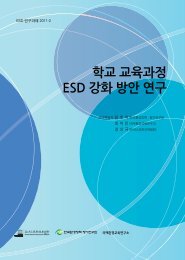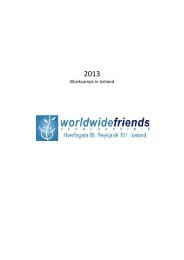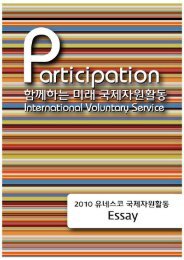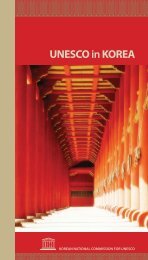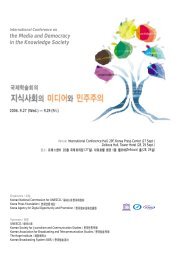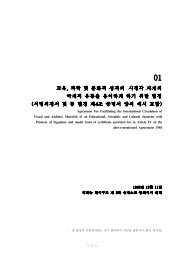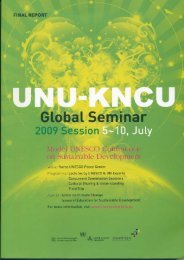DMZ ì¼ì ìí ííì ê´ë¦¬ë¥¼ ìí êµì 컨í¼ë°ì¤ - ì ë¤ì¤ì½íêµììí
DMZ ì¼ì ìí ííì ê´ë¦¬ë¥¼ ìí êµì 컨í¼ë°ì¤ - ì ë¤ì¤ì½íêµììí
DMZ ì¼ì ìí ííì ê´ë¦¬ë¥¼ ìí êµì 컨í¼ë°ì¤ - ì ë¤ì¤ì½íêµììí
Create successful ePaper yourself
Turn your PDF publications into a flip-book with our unique Google optimized e-Paper software.
Suggestions for bilateral cooperation<br />
between North and South Korea:<br />
Learning from success stories<br />
❖ Background<br />
Ms. Belinda BOWLING<br />
Senior UNEP Expert<br />
Post Conflict and Disaster Management Branch (PCDMB)<br />
UNEP(United Nations Environment Programme)<br />
The peace building potential of natural resources, fragile ecosystems and the environment<br />
in areas straddling disputed or conflict prone political boundaries stems from a number of<br />
properties that make them a good platform for cooperation between divided groups or<br />
countries. First, while parties may diverge on certain political issues, they often share a<br />
common dependence on the resources found in these disputed border regions. Given that<br />
ecosystems and natural resources ignore political boundaries, parties are encouraged to work<br />
together to sustainably manage resources or address common environmental threats in these<br />
regions. Second, in contrast to political needs and self interests of parties (which are often<br />
short-term in nature), environmental and natural resource management often requires<br />
long-term cooperation, thereby providing an opportunity to build up trust over time and in<br />
a step-wise manner. Third, given that natural resources or environmental problems present<br />
in disputed or conflict-ridden zones can often be empirically quantified, political rhetoric or<br />
misguided perception can often be transformed into a more technical debate. Finally,<br />
cooperation over natural resources and the environment serves as a platform for<br />
‘inclusivity’, encouraging dialogue and communication between and across different actors<br />
from different levels and social strata.<br />
In short, over time, it is UNEP’s view that regular interaction and cooperation between<br />
divided groups over a specific resource issue or a common environmental threat in a<br />
disputed border region or conflict affected zone may translate into changes of perception,<br />
attitude and behaviour between former adversaries at the individual level. The ultimate aim<br />
is that, with coordinated action, such cooperation will lead to spillover effects and generate<br />
broader social and political dialogue at the higher leadership levels.<br />
❖ Pathway of cooperation<br />
While there are no templates for transforming environmental cooperation into broader<br />
Nature, Peace and Local Development ❙ 97



